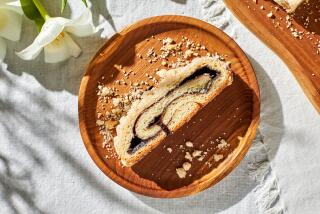Oat Bran: No Magic Bullet Against Cholesterol
- Share via
In the late ‘80s, when the oat-bran craze was at its height, food entrepreneur David Liederman was selling more than 120,000 oat-bran muffins a week. More than 30,000 copies of Linda Romanelli Leahy’s “The Oat Bran Cookbook” were bought in less than two months. Sales of Quaker Oats Co.’s oat-bran hot cereals jumped from 1 million pounds in 1987 to more than 20 million pounds in 1989.
In January 1990, oat bran tumbled from this proud eminence. The full glare of media attention was focused on a Harvard University study, published in the New England Journal of Medicine, that found no significant differences in serum cholesterol levels between people who ate oat bran and those who ate products made with white flour.
Within weeks of the study’s release, Leahy says, sales of her oat-bran cookbook dipped dramatically. Quaker Oats saw its oat-bran sales drop by 50%, and Liederman’s oat-bran muffin business literally vanished. How could one study abruptly halt the oat-bran frenzy that had been fed by a dozen or so positive reports about its cholesterol-lowering benefits?
The answer shows more about us than it does about oat bran, which most medical experts agree is a fine product. David Levitsky, a Cornell University psychologist and nutrition expert, says the Harvard study simply gave many an excuse to go back to their old meat-and-potato ways of eating. It is also natural, says UCLA consumer psychologist David Stewart, for consumers “to walk away from confusing issues, to not buy the product.”
Levitsky says the long enthusiasm for oat bran (“a food so homey”) had fulfilled strong emotional needs: “It satisfied our dream to have a magic bullet, to have one single food to cure all our ills. The fact that this study didn’t find any effect doesn’t mean that none exists. We can’t find the whole truth in any single study, and as far as oat bran, there have been numerous positive conclusions.”
The craze had skyrocketed in part because weak labeling laws allowed health claims to fuel our passion for simplistic solutions, says Robert Nicolosi, a Lowell (Mass.) University biochemist. By 1990, says University of Kentucky nutritionist Belinda Smith, “it was time for a little oat-bran bashing. It soon became too much of a darling. It was in everything, it was everywhere.”
Ron Botrell, a Quaker Oats spokesman, says oat-bran cereal was introduced in 1983 but at first had only limited popularity, and only with a well-read, health-conscious market. The craze didn’t come until 1987, when the U.S. government launched its Know Your Cholesterol campaign.
A flood of press coverage followed, with every connection between oat bran and cholesterol covered. The biggest push came from Robert Kowalski’s best-selling book, “The 8-Week Cholesterol Cure,” which jumped to best-seller status and stayed there for two years. “It was one of the best-selling advice books at Harper & Row, ever,” says Botrell.
A year after the oat-bran bubble burst, however, oat bran has not died. “Sales are stable and steady; they’re not declining,” says Phil Lempert, an industry trend watcher and editor of the Lempert Report, although he acknowledges sales are down from their peak of a year and a half ago. “People who have a long-range and realistic approach to health still have oat bran and oatmeal in their cupboards, although not in their high-fat muffins.”
“If people enjoy eating oatmeal or oat bran,” says Jayne Newmark, a nutritionist who counsels cardiac patients at the Arizona Heart Institute, “I still recommend it for a low-fat, cholesterol-lowering diet. Oat bran is not a panacea, but, like eating more beans, more fish, more fruits and vegetables, oat bran offers that extra edge.”
At the University of Kentucky, five studies led by fiber expert Dr. James Anderson have found significant cholesterol-lowering results with soluble fiber. Some of Anderson’s studies, reports Belinda Smith, have shown as much as a 13% to 19% drop in formerly high cholesterol levels.
It is not that oat bran is uniquely useful for cholesterol control, Smith says. Fruits, beans and some vegetables also provide water-soluble fiber, the kind that does the trick. But oat bran by itself is also practical, versatile, safe and easy to use.
While it may not be that miracle cure we want it to be, nutritionists generally agree that oat bran is a good fiber food that deserves to be part of a low-fat diet.
More to Read
Eat your way across L.A.
Get our weekly Tasting Notes newsletter for reviews, news and more.
You may occasionally receive promotional content from the Los Angeles Times.






